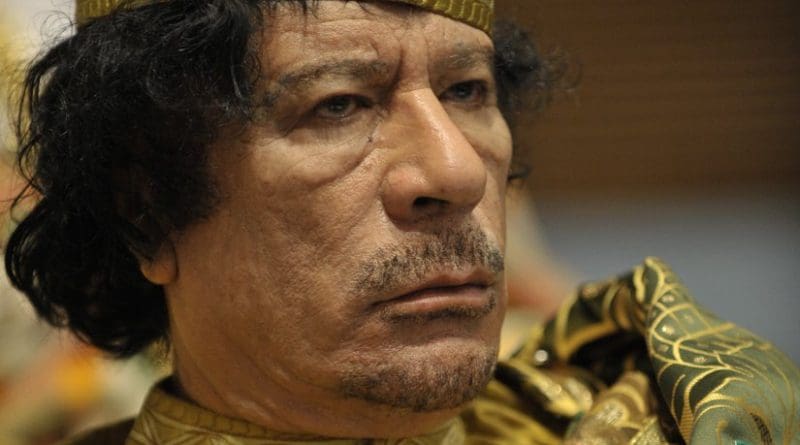Libya: “Alliance Of Friends” Instead Of United Defender – OpEd
By VOR
By Igor Siletsky and Anisimov Sergey
This week, the UN Security Council unanimously adopted a resolution on lifting the no-fly zone over Libya. The resolution, which had been put forward by Russia, stipulates that NATO’s operation should come to an end at 23:59 Libyan time on October 31st . Analysts warn, however, that the civil war in Libya is going to escalate as Libyan clans are set to commence their scramble for influence.
Colonel Gaddafi died in the sands of the Libyan desert, the country’s new authorities say. Other reports claim that the bodies of Gaddafi and his son had been burnt. Whatever the case, members of the National Transitional Council did their best to ensure that no traces of Gaddafi’s burial were ever found.
Video pictures of Gaddafi’s arrest and death taken by a number of amateur photographers from among members of the NTC reveal horrendous scenes of the colonel being beaten to death by his so-called “people” and of these “people” queuing up to enjoy the sight of his slowly decomposing body for several days afterwards. NATO’s United Defender Operation struck a final chord in the past week. As usual, the alliance claimed to have been defending human rights.
Russia’s Foreign Minister Sergei Lavrov has called for an international inquiry into the circumstances of Colonel Gaddafi’s death. Gaddafi’s relatives are planning to file a lawsuit against NATO with the International Criminal Court, Al Jazeera reports. According to lawyer Marcel Secaldi, Colonel Gaddafi was killed during a NATO raid on his convoy. But since NATO’s mandate in Libya did not allow for strikes against civilian targets, the incident could be classified as a war crime.
Libya’s new authorities quickly responded that they didn’t want Gaddafi’s death as the colonel could have shed light on many unsolved mysteries. The NTC’s members are not telling the truth. Many of them defected to the NTC after years of service with Gaddafi. Had Gaddafi faced trial, Libya’s so-called “new Democrats” would be tarnished, too. Thursday’s reports that Gaddafi’s son Saif al-Islam and intelligence chief Abdullah al-Senussi had wanted to surrender to the International Justice Court and requested refuge in a third country – Tunisia or Algeria – to facilitate the process have been dismissed by the NTC as merely a trick aimed at biding time.
As for Gaddafi family’s lawsuit, a co-Chairman of the Russian Military Political Analysts Association Vasily Belozerov believes that it will be a fruitless exercise.
“The court’s judgment will be politically motivated. It won’t be directed against ‘the powers that be’, like NATO, or against the current government in Libya. The reason is crystal clear. Even though the legitimacy of NATO’s operation in Libya was questionable from the very beginning, the international community kept quiet. They won’t have a chance. They won’t be able to sue anyone since there will be no one to sue. The world’s most powerful military and political alliance had resolved to overthrow a politically stable regime.”
Nevertheless, such a lawsuit would have at least some merits, expert Boris Dolgov says.
“The lawsuit could shed the light on the circumstances of Gaddafi’s death and draw international attention to the fact that NATO’s forces had sided with the opposition in Libya’s civil war.”
In the past week, it has also become clear that other countries had joined NATO in taking sides with the rebels fighting against Gaddafi. Among NTC fighters were hundreds of Qatari servicemen. Reports from Doha say that Qatar will head the so-called “multi-national alliance of friends to support Libya”. The commander of Qatar’s army told a Voice of Russia correspondent that Qatari aviation would be safeguarding air space over Libya because Tripoli had no planes left.
The end of Operation United Defender doesn’t mean that NATO is getting out of it all. Even before the Security Council resolution, the US State Department said that the NTC could resort to NATO’s help in the future. Expert Vasily Belozerov comments.
“Oil was the real reason behind the crisis in Libya. Why else would they decide to topple Gaddafi, of all other leaders? Because of the fierce struggle for Libya’s natural resources. Now, Libya will need to be kept under control, so NATO might seek to deploy army units, military bases or other infrastructure on its territory or that of its neighboring countries.”
Many experts believe that Libya’s new authorities are powerless to ensure stability in the country. The NTC itself is torn by conflict. Young insurgents, who are no longer needed by the new authorities, may pose a serious threat. Libyans are happily stealing weapons from Gaddafi’s arms depots. Russia has urged the UN Security Council to consider passing a draft resolution calling on Tripoli to prevent weapons from entering neighboring countries.
NATO’s Secretary General Anders Fogh Rasmussen has described Operation United Defender as ‘brilliant’. NATO, he said, has acted in full compliance with the UN mandate for the protection of the Libyan civilians and ensured the no-fly zone and the arms embargo. Russia’s Ambassador to NATO Dmitry Rogozin disagreed, stating that the alliance had misinterpreted the UN resolution and assumed to itself the right to decide the future of Libya. The consequences of the Libyan campaign will be analyzed during the meeting of the Russia-NATO Council on December 8th.

